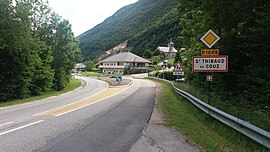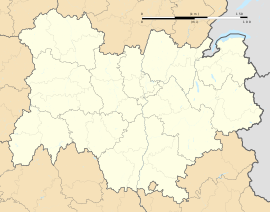Saint-Thibaud-de-Couz (pronounced [sɛ̃ tibo də ku]) is a commune of the Savoie department in the Auvergne-Rhône-Alpes region in south-eastern France.
Saint-Thibaud-de-Couz | |
|---|---|
 The road into Saint-Thibaud-de-Couz | |
| Coordinates: 45°30′06″N 5°50′42″E / 45.5017°N 5.845°E | |
| Country | France |
| Region | Auvergne-Rhône-Alpes |
| Department | Savoie |
| Arrondissement | Chambéry |
| Canton | Le Pont-de-Beauvoisin |
| Intercommunality | CC Cœur de Chartreuse |
| Government | |
| • Mayor (2020–2026) | Denis Blanquet[1] |
Area 1 | 24.17 km2 (9.33 sq mi) |
| Population (2022)[2] | 1,097 |
| • Density | 45/km2 (120/sq mi) |
| Time zone | UTC+01:00 (CET) |
| • Summer (DST) | UTC+02:00 (CEST) |
| INSEE/Postal code | 73282 /73160 |
| Elevation | 460–1,676 m (1,509–5,499 ft) |
| Website | www.st-thibaud-de-couz.fr |
| 1 French Land Register data, which excludes lakes, ponds, glaciers > 1 km2 (0.386 sq mi or 247 acres) and river estuaries. | |
Geography
editThe village of Saint-Thibaud-de-Couz is located in the middle valley of the Hyères between Mont Grêle (1425 m) and Mont Outheran (1,676 m). Forests cover half of the township. The township is part of the Communauté de communes Cœur de Chartreuse.
Toponymy
editIn the eleventh century, a Breton monk named Theobaldus built for pilgrims and travelers a "Hostellerie priory", at a place called Pre Chartreux between the Gencourt and the Poulemonts. Theobaldus gave the town its name (Thibaud), we called then the town under the name of Saint Thibaud.
Full name Saint-Thibaud-de-Couz is mentioned for the first time in Latin in 1497 in the cartulary Labaudie "Parrochia Sancti theobaldi de Couz". The name Couz, which means "pass" was used to refer to the Hyères valley until the Caves parade.
History
editAfter the planning of the caves parade by Charles Emmanuel II in 1670, crossing of the marshes of Saint-Thibaud-de-Couz located in the plain was still a real problem. Many travelers complained to the authorities; there was even, say, three people mired with their carriage in 1684. It was the draining of wetlands under Napoleon that allowed to borrow road Chambéry - Lyon without much difficulties.
In the late 1990s, excavations have revealed traces of prehistoric occupation, dating from the late high Palaeolithic (12 000 years BC.)
Policy and administration
editThis section is empty. You can help by adding to it. (June 2014) |
Population and society
editDemographics
editIn 2011, the municipality had 975 inhabitants.
Cultural events and festivities
editMedia
editSports
editPersonalities
editSights
edit- Church of Saint-Thibaud de Couz
See also
editReferences
edit- ^ "Répertoire national des élus: les maires" (in French). data.gouv.fr, Plateforme ouverte des données publiques françaises. 13 September 2022.
- ^ "Populations de référence 2022" (in French). The National Institute of Statistics and Economic Studies. 19 December 2024.
External links
edit


